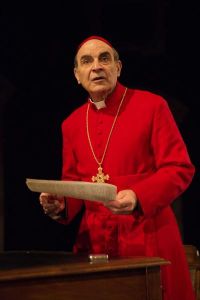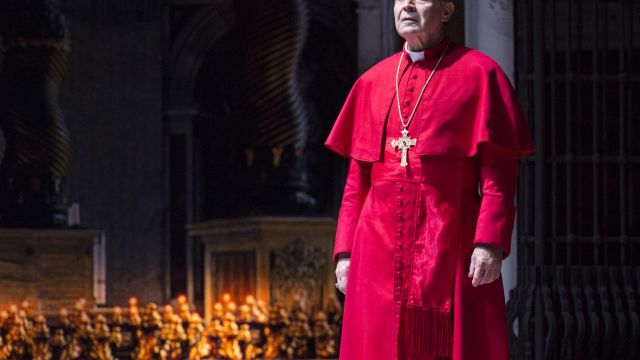The Last Confession
It’s rare that we get a chance to see 20 actors of “A Certain Age” display their talents in one play. This, in itself, is worthy of praise, for in truth Crane’s debut play is a somewhat stodgy affair, frequently ponderous and plodding and covering the same ground repeatedly; but the performances, in some strange paradox, lift it to exalted heights.
Whilst publicity pushes the detective “whodunnit?” aspect of the story (presumably because of David Suchet’s fame as Hercule Poirot), that aspect has a disappointing narrative trajectory and what we have at the core is an examination of Vatican politics and the machinations of the Catholic Church. Given the current troubles and the fall from grace of the Mother Church, a possible murder, even of a Pope, seems mild by comparison. True, it pays lip-service to being critical of the Vatican, but ultimately it fence-sits and is without any real passion at its core….making the performances even more surprising.
 The story centres around Cardinal Bellini (Suchet) who is walking a fine line between his ambition and a crisis of Faith. He wants to be Pope, but isn’t sure he believes in God, and he certainly has little time for the Curia…the political arm that runs the Church. He’s wise enough to know that the power will corrupt him and so he engineers the appointment of a gentle but radical cardinal who becomes John Paul 1. Bellini has genuine regard for this “honest man” but also seeks to be his chief advisor. When John Paul is found dead sitting up in bed after only 33 days on the Papal throne, it is Bellini who realises that things are being covered up, and the prospect of murder rears its head.
The story centres around Cardinal Bellini (Suchet) who is walking a fine line between his ambition and a crisis of Faith. He wants to be Pope, but isn’t sure he believes in God, and he certainly has little time for the Curia…the political arm that runs the Church. He’s wise enough to know that the power will corrupt him and so he engineers the appointment of a gentle but radical cardinal who becomes John Paul 1. Bellini has genuine regard for this “honest man” but also seeks to be his chief advisor. When John Paul is found dead sitting up in bed after only 33 days on the Papal throne, it is Bellini who realises that things are being covered up, and the prospect of murder rears its head.
One can’t go any further without mentioning the astonishing David Suchet. He is Charisma in a red robe as Bellini. In a complete three-dimensional portrayal, the actor is an astonishingly human paradox, arrogant yet self critical, assured, yet doubting; afraid of power, yet craving it. His voice cuts like a knife in even the softest speeches, and his diction is extrordinary. His command of the stage means you look at no-one else when Bellini is the focus, yet barely notice him when the emotional thrust is elsewhere. Suchet said in an interview once, “I very much believe in the principles of Christianity and the principles of most religions, actually—that one has to abandon oneself to a higher good”. It’s that struggle with surrender that Suchet realises so beautifully.

Philip Craig, whom we know mostly from his film work, is an impressive presence (and an excellent foil for Suchet) as The Confessor who is revealed as so much more…their final scene together is electrifying. Richard O’Callaghan is perfect as ‘The Man who Wouldn’t be Pope’ and his humanity and humility are in stark contrast to those around him. It’s beautifully measured playing of a quiet role which could be swamped in the histrionics. Veterans Bernard Lloyd and Ex-pat Kevin Colson both give excellent convincing performances as Cardinals Ottavianni and Baggio respectively and Donald Douglas makes Pope Paul V1 a deeply sympathetic character depsite that Pope’s failure to get anything of great importance done. John O’May (Cardinal Felici) is, as always, a commanding presence with a flawless sense of timing, and Nigel Bennett (Cardinal Villot) brings his vast body of work to creating a complex man juggling his own agenda. The rest of the cast, including our own George Spartels (Cardinal Lorscheider) and the one female, Sheila Ferris (as the endearing Sister Vincenza) are all to be commended on such fine ensemble playing.
It’s a superb cast, beautifully directed by Jonathan Church, with an amazing set designed by William Dudley to be both opulent, and yet resemble a jail. Peter Mumford’s lighting design is a testament to how important lighting is to a production. The Last Confession is a class act as a production, but the sum of the parts far outweigh the blueprint, the text, itself – and rarely does that happen in theatre.
Coral Drouyn
Photographer: Cylla von Tiedemann.
Subscribe to our E-Newsletter, buy our latest print edition or find a Performing Arts book at Book Nook.

